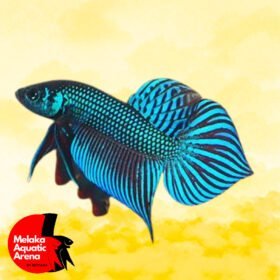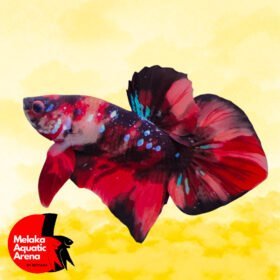MAA Blog, Show Betta Variations Spotlight
The Standard for Spade Tail Betta Fish: Traditional vs. Modern
The Standard for Spade Tail Betta Fish: Traditional vs. Modern
The Spade Tail Betta Fish is distinguished by its tail shape, which closely resembles a spade. While the general criteria for Betta splendens apply to Spade Tail Bettas, the focus here is on the unique differences between the Traditional and Modern forms of this variation. Understanding these distinctions is crucial for breeders, judges, and enthusiasts who aim to meet and appreciate the standards set for these exquisite fish.
Tail Shape and Structure
The defining feature of the Spade Tail Betta Fish is its caudal fin, which tapers to a point, resembling the shape of a spade. This unique tail shape is the primary criterion that separates Spade Tail Bettas from other Betta varieties. However, within this category, there are significant differences between the Traditional and Modern forms.
Traditional Spade Tail Betta Fish

Dorsal and Anal Fins
In the Traditional Spade Tail Betta, which closely resembles the Traditional Plakat, the dorsal and anal fins maintain primary branchings. This means that the fin rays exhibit minimal splitting, preserving a simpler and more streamlined appearance that is characteristic of early Betta breeds.
Caudal Fin
The caudal fin in Traditional Spade Tail Bettas features secondary splits. This secondary branching ensures that while the fin retains some complexity, it remains relatively understated compared to more modern Betta varieties. The tail must be symmetrical and pointed at the center line, with the caudal spread reaching 180 degrees and rounded edges being acceptable.
Body and Finnage Proportion
For Traditional Spade Tail Bettas, the caudal fin’s length should be half of the body length, measured from the peduncle to the pointed tip. This 1:2 ratio ensures a balanced and proportionate appearance, aligning with the fish’s streamlined form.
Modern Spade Tail Betta Fish

Dorsal and Anal Fins
The Modern Spade Tail Betta, influenced by advanced breeding techniques, exhibits more complex fin structures. Both dorsal and anal fins in this form have extensive branching, often reaching quarternary splits. This intricate fin development creates a fuller and more voluminous appearance, adding to the fish’s overall aesthetic appeal.
Caudal Fin
The caudal fin of the Modern Spade Tail Betta must have a minimum of quarternary splits, resulting in a highly branched and elaborate structure. The tail should also be broader, with unpaired fins lapping over each other, contributing to a more majestic and imposing display. The caudal spread should reach 180 degrees with rounded edges, and the tail must be symmetrical and pointed at the center line.
Body and Finnage Proportion
Similar to the Traditional form, the caudal fin in Modern Spade Tail Bettas should adhere to the 1:2 body-to-fin ratio, ensuring that the fin’s length is half the body length from the peduncle to the tip. This proportion is critical for maintaining the fish’s balanced and harmonious appearance despite the more elaborate fin structures.
@48betta4ucom #spadetailbetta #spadetailbettafish #spadetailbettas #showbettafish_indonesia #showbettathantell #showbettaworld #showbettafish #showbettas #showbetta #showbettathanicantell #bettatrial #bettasplendens #bettalover #bettafish #bettakoi #betta #bettausa #bettasofinstagram #bettacommunity #bettaindonesia #bobbychuawriting #bobbychua #BobbyChua #melakaaquaticarena #bsmstandards #shortfinbettafish #shortfinbettasplenden #shortfinbettas #shortfinbetta
♬ LOVE LIGHT ZONE – Solomon Jaye
Criteria for Spade Tail Betta Fish
Caudal Spread and Edges
A key criterion for both Traditional and Modern Spade Tail Bettas is the caudal spread, which should reach 180 degrees. Rounded edges are accepted, provided they do not detract from the overall spade shape. This spread ensures that the tail is wide and symmetrical, enhancing the fish’s visual appeal.
Caudal Symmetry
Symmetry in the caudal fin is crucial. The tail should be mirrored on both sides, creating a balanced and harmonious look. This symmetry is essential for both aesthetic reasons and for the fish’s overall health and functionality.
Pointed Caudal
The tail must taper to a point at the center line, resembling the shape of a spade. This pointed feature is the defining characteristic of Spade Tail Bettas and must be clearly visible in both Traditional and Modern forms.
Proportion of Caudal to Body Length
The proportion of the caudal fin to the body length is another critical criterion. The caudal fin should measure half the body length from the peduncle to the pointed tip, maintaining a 1:2 ratio. This ensures that the tail is proportionate to the body, contributing to the fish’s balanced and graceful appearance.
Conclusion
The Spade Tail Betta Fish, with its distinctive spade-shaped tail, stands out in the Betta community. Understanding the differences between the Traditional and Modern forms is essential for breeders, judges, and hobbyists aiming to meet the standards for these stunning fish. The Traditional form adheres to simpler, more classic fin structures, while the Modern form showcases elaborate and intricate fin developments. Both forms, however, must meet specific criteria regarding caudal spread, symmetry, pointed caudal, and proportion of caudal to body length. By adhering to these standards, breeders and enthusiasts can ensure the preservation and appreciation of the unique beauty of Spade Tail Betta Fish.
Facebook | Instagram | Telegram | Youtube | Twitter | Posts |

